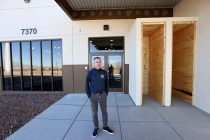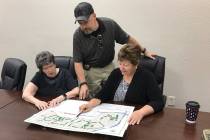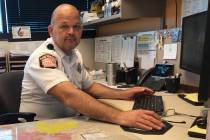Program keeps old drugs out of water system
Gather up those old prescription bottles lying around your medicine cabinet or maybe stuck away in some drawer. Pack them into a plastic bag, but do not remove the contents from the bottles.
Then take them to the closest Metropolitan Police Department substation. For most Summerlin residents, that is the Northwest Area Command, 9850 W. Cheyenne Ave.
There’s a big, green drop-off box conveniently located in the lobby. It’s called a medicine disposal box. You can’t miss it. And the same kind of big, green boxes are situated in the lobbies of all Las Vegas substations and other police stations throughout the county.
Deposit your old medications into the green box. Then walk away with the satisfaction of having performed a highly commendable deed.
It wasn’t until I followed the above that I learned about the magnitude of the Medicine Disposal Program and how well it’s being administered in Clark County. Of most concern, it keeps those old drugs from being flushed down toilets and thus from being circulated through the delicate process of our water treatment facilities.
What it all means is that remnants of these old drugs won’t be scattered into our drinking water. The indiscriminate dumping of such medications has become a matter of such grave concern that it resulted in the issuance of federal guidelines to deal with the problem.
Clark County has never been immune from this issue, which had been steadily growing out of control. The concerns are of health and environmental natures, both of which have mandated an urgent need for the MDP, known as Pain in the Drain. As a result, the program was instituted throughout the county four years ago and has since grown into a rousing success.
It’s not just the 20 police stations and headquarters in the county that are participating in promoting what is being proclaimed as a highly laudable program. The Clark County Water Reclamation District has joined in as a principal co-sponsor. In fact, it was the water reclamation district that volunteered some of the initiative by providing the big, green MDP boxes shortly after the program got started.
“It’s a very popular disposal program. And it’s growing in use as people become aware of it,” said officer Oscar Menendez, a spokesman for the Las Vegas police. “This method of disposing of old medications gives the public a safe option.
“We keep urging residents to use this procedure when disposing of old prescription drugs. Don’t throw them in the toilet or even in the garbage. Bring them to any police station and deposit them in one of the green boxes. Let us dispose of them in an environmentally sound manner.”
He explained that it was the department’s Narcotics Section that developed and shaped the MDP. Narcotics officers periodically remove the contents from the green boxes, “then they dispose the materials by using a special process,” Menendez said.
Ed Carrasco, regulatory and compliance administrator for the water reclamation district, said that shortly after the MDP was implemented, the district heard the call for a method to help with the disposal of old drugs.
“We donated the boxes to encourage public awareness of proper disposal, to keep old medications out of our water resources,” Carrasco said.
And the district’s promotional literature couldn’t be more to the point: “Don’t rush to flush. Prevent abuse, poisoning and pollution! You can properly dispose your unused medicines at a police substation near you.”
The pollution of public waters had developed into so serious a matter that six years ago, the Food and Drug Administration worked with the White House Office of National Drug Control Policy to develop the first guidelines for proper disposal of prescription drugs.
The FDA found that “increasingly, prescription and non-prescription medications, many of which are not effectively destroyed by sewage treatment plants, are finding their way into streams and drinking water supplies.”
Paramount among the updated federal guidelines in 2009 was strong concern for the need to avoid flushing drugs into the toilet.
The new guidelines placed a priority focus on state and local enforcement agencies for encouraging the kind of programs that resulted in the water reclamation district bringing the big, green boxes into all police facilities in Clark County.
Herb Jaffe was an op-ed columnist and investigative reporter for most of his 39 years at the Star-Ledger of Newark, N.J. His most recent novel, “Double Play,” is now available. Contact him at hjaffe@cox.net.

















